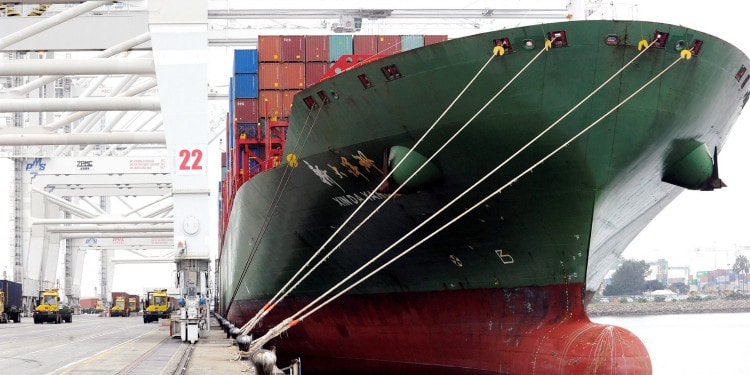We are now facing an escalating trade war between the US and China – started by the US. The question is: can the US win? And what will it cost the world?
It is worth listening to Carlos Gutierrez, co-chairman at Albright Stonebridge Group, a major global corporation and former U.S. Commerce Secretary who spoke on 18 June on “Bloomberg Daybreak: Americas”:
He reminds us that the free-trade agreements that have been brokered since the 1980s are not as bad as Trump would have it: they have consistently given the US a surplus. The point is: There never was a similar agreement with China. And he doesn’t mince words in describing the dangers for the whole world. He urges restraint.
Clearly Trump is not listening. A few hours after Gutierrez talked to Bloomberg, Trump had threatened an additional 10% tariffs on another $200 billions worth of goods:
Trying to answer the question of “who wins a trade war”, Bloomberg has rounded some major experts asking them what they thought. While the answers are interesting, they all focus on the short term and unfortunately don’t go beyond are the framework of classical economic analysis which overlooks geo-political factors:
- China has limited room to retaliate in a trade war escalation: It only buys $130 billion worth of American goods while the US deficit with China runs to $375 billion; this is a “high stakes game of poker” and “China will run out of U.S. imports that it can hit with tariff countermeasures long before the U.S. does” (Rajiv Biswas, IHS Markit Singapore);
- China needs to open up to global innovation and investment: “both China and the U.S. and other countries can really benefit from this Made-in-China 2025 strategy” (William Zarit, chairman of American Chamber of Commerce in China);
- This is creating a “perfect storm” for China’s export Industry: it’s not just Trump’s tariff war but also the probable US Senate ban on ZTE, the Chinese electronic producer that Trump wanted to save; such a ban would stop it from importing the American chips it needs for its phones and other products, hitting at the very heart of Made-in-China 2025 strategy;
- There will be winners and losers, for example, China will need to buy agricultural goods from other sources than the US and that will benefit countries like Australia and Brazil; many Asian countries that are part of the China value chain will be hit.
Instead, to evaluate the dangers from a trade war, we need to look at the longer term and more broadly to geo-political factors. And here, the picture is not so reassuring.
The trade war with the US is but a battle in a much larger war. A battle that surely hurts in the short run, but will leave China victorious in the long run. Because China has acquired the “soft power” weapons to win.
Forget the Trade War: China’s Soft Power is Poised to Conquer the World
What has been happening since Trump took over the White House is this: A political void has been created, a void in world leadership that China is eager to fill, and most likely will.
Consider the facts. Trump is busy blowing up the post-World War II international order established by America, fighting systematically historic allies. Trump regularly insults them, most recently at the G7 meeting in Canada. And he keeps doing it, here’s his latest blast at Germany and Europe (dated 18 June):
The people of Germany are turning against their leadership as migration is rocking the already tenuous Berlin coalition. Crime in Germany is way up. Big mistake made all over Europe in allowing millions of people in who have so strongly and violently changed their culture!
— Donald J. Trump (@realDonaldTrump) June 18, 2018
China is quietly taking advantage and getting ready to become the “next empire”. For now, it’s not a military battle, it’s a “soft power” battle that America is rapidly losing.
In practice, the US has demolished the G7. The question is: Will the G6 be powerful enough to assume world leadership without the U.S.? If not, China will. It is already a global economic powerhouse and has prove it, pulling the world out of the Great Recession caused by America.
We have gotten used to rely on China for our economic health. Now, when China’s economy is showing signs of slowing down, investors immediately worry and ask: Are we headed for a China-led world recession?
The latest news about China’s economic health are not reassuring. “China’s growth stutters as factories slow down” titled the UK Guardian in December 2017. More recent data appears to confirm the slowdown, ringing in “multi-decade lows”.
The trade war with the US certainly comes at a bad time for China. But that doesn’t mean it will lose the trade war against the US.One needs to looks at the big picture, not just US trade deficits.
Made-in-China 2025: Value-chain is the name of the Trade War Game
China has been a top player in global trade for decades, with exports currently worth $2 trillion. What is remarkable is that only one quarter of its exports goes to the US. And of that quarter, only two thirds are really “made in China”, the rest is the result of foreign investments in the value chain.
Xi Jinping, the Chinese leader, has a longer-term vision for China 2025, that includes a strategy for moving China up the value chain. The aim is to increase the proportion of locally-made content in Chinese products. The ultimate goal of the China 2025 strategy is to lead the world in advanced technologies, like artificial intelligence, self-driving cars, electric vehicles, green energy and biotech.
In a full-blown war, China “holds all the aces” as CNBC recently titled. The reason is simply a matter of size in global trade: Markets for Chinese products beyond and outside of the US are three times bigger. That is why the US will eventually lose the trade war with China.
Looking beyond the trade war: China’s Soft Power Weapons
There are three weapons China is wielding.
- Political cooperation: The Shanghai Cooperation Organization, created in 2001 with most of China’s Asian neighbors in Central Asia, plus Russia; with the recent addition (in 2017) of India and Pakistan, it is known as the “Alliance of Asia”; the latest meeting was pointedly held at the same time as the G7.
- Infrastructural investments: The Asian Infrastructure Investment Bank, started in January 2016, with now 86 “approved members”, including European countries (but not the US and Japan) and already a hefty list of approved “sustainable” projects mostly in Asian countries; India tops the list, with Egypt the only African beneficiary so far.
- Economic investments: The Belt and Road Initiative (BRI), since it was unveiled by Xi-Jinping in 2013, has made huge progress on both its fronts, building land and maritime corridors all the way to Africa and Europe.
Will this translate to a triple whammy on the world? Perhaps not, consider the Belt and Road Initiative, it doesn’t always work as the Chinese intended:
And of course, as improbable as it sounds, Europe could always wake up, and change the game for China.
Undoubtedly, should China prevail over the long run, we would be heading towards a difficult world where the rule of law and human rights would no longer be respected. That might sound abstract and unlikely, but we should not take the Chinese challenge lightly.
Even the humorist John Oliver manages to be uncharacteristically serious about China, but no fear, he remains funny to the last:
Editors Note: The opinions expressed here by Impakter.com columnists are their own, not those of Impakter.com
Cover Photo: A Chinese container ship being loaded at the port of Long Beach, Calif., April 2018. (Bob Riha/Reuters) – Photo courtesy of Reuters.com









